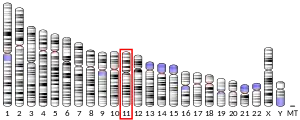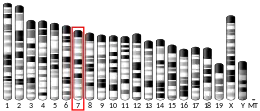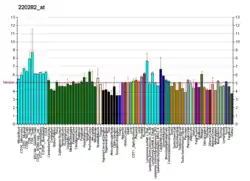RIC3
RIC-3 also known as resistance to inhibitors of cholinesterase 3 is a chaperone protein that in humans is encoded by the RIC3 gene. The RIC3 gene was first discovered in C. elegans.[5] RIC-3 protein is conserved in most animals and influences the maturation of various ligand gated ion channels including the serotonin 5-HT3 receptor and nicotinic acetylcholine receptors,[6][7] particularly the homomeric α7 nicotinic receptor. RIC-3 enhances currents generated by these receptors by expediting receptor transport to the cell surface and by increasing receptor number.[8]
| RIC3 | |||||||||||||||||||||||||||||||||||||||||||||||||||
|---|---|---|---|---|---|---|---|---|---|---|---|---|---|---|---|---|---|---|---|---|---|---|---|---|---|---|---|---|---|---|---|---|---|---|---|---|---|---|---|---|---|---|---|---|---|---|---|---|---|---|---|
| Identifiers | |||||||||||||||||||||||||||||||||||||||||||||||||||
| Aliases | RIC3, AYST720, PRO1385, RIC3 acetylcholine receptor chaperone, RIC-3 | ||||||||||||||||||||||||||||||||||||||||||||||||||
| External IDs | OMIM: 610509 MGI: 2443887 HomoloGene: 49772 GeneCards: RIC3 | ||||||||||||||||||||||||||||||||||||||||||||||||||
| |||||||||||||||||||||||||||||||||||||||||||||||||||
| |||||||||||||||||||||||||||||||||||||||||||||||||||
| |||||||||||||||||||||||||||||||||||||||||||||||||||
| |||||||||||||||||||||||||||||||||||||||||||||||||||
| |||||||||||||||||||||||||||||||||||||||||||||||||||
| Wikidata | |||||||||||||||||||||||||||||||||||||||||||||||||||
| |||||||||||||||||||||||||||||||||||||||||||||||||||
References
- GRCh38: Ensembl release 89: ENSG00000166405 - Ensembl, May 2017
- GRCm38: Ensembl release 89: ENSMUSG00000048330 - Ensembl, May 2017
- "Human PubMed Reference:". National Center for Biotechnology Information, U.S. National Library of Medicine.
- "Mouse PubMed Reference:". National Center for Biotechnology Information, U.S. National Library of Medicine.
- Nguyen M, Alfonso A, Johnson CD, Rand JB (Jun 1995). "Caenorhabditis elegans mutants resistant to inhibitors of acetylcholinesterase". Genetics. 140 (2): 527–35. doi:10.1093/genetics/140.2.527. PMC 1206632. PMID 7498734.
- Halevi S, Yassin L, Eshel M, Sala F, Sala S, Criado M, Treinin M (Sep 2003). "Conservation within the RIC-3 gene family. Effectors of mammalian nicotinic acetylcholine receptor expression". J Biol Chem. 278 (36): 34411–7. doi:10.1074/jbc.M300170200. PMID 12821669.
- "Entrez Gene: RIC3 resistance to inhibitors of cholinesterase 3 homolog (C. elegans)".
- Williams ME, Burton B, Urrutia A, et al. (2005). "Ric-3 promotes functional expression of the nicotinic acetylcholine receptor alpha7 subunit in mammalian cells". J. Biol. Chem. 280 (2): 1257–63. doi:10.1074/jbc.M410039200. PMID 15504725.
Further reading
- Cheng A, Bollan KA, Greenwood SM, et al. (2007). "Differential subcellular localization of RIC-3 isoforms and their role in determining 5-HT3 receptor composition". J. Biol. Chem. 282 (36): 26158–66. doi:10.1074/jbc.M703899200. PMID 17609200.
- Castillo M, Mulet J, Gutiérrez LM, et al. (2007). "Role of the RIC-3 protein in trafficking of serotonin and nicotinic acetylcholine receptors". J. Mol. Neurosci. 30 (1–2): 153–6. doi:10.1385/JMN:30:1:153. PMID 17192664. S2CID 41109579.
- Lansdell SJ, Gee VJ, Harkness PC, et al. (2005). "RIC-3 enhances functional expression of multiple nicotinic acetylcholine receptor subtypes in mammalian cells". Mol. Pharmacol. 68 (5): 1431–8. doi:10.1124/mol.105.017459. PMID 16120769. S2CID 12901942.
- Castillo M, Mulet J, Gutiérrez LM, et al. (2005). "Dual role of the RIC-3 protein in trafficking of serotonin and nicotinic acetylcholine receptors". J. Biol. Chem. 280 (29): 27062–8. doi:10.1074/jbc.M503746200. PMID 15927954.
- Cheng A, McDonald NA, Connolly CN (2005). "Cell surface expression of 5-hydroxytryptamine type 3 receptors is promoted by RIC-3". J. Biol. Chem. 280 (23): 22502–7. doi:10.1074/jbc.M414341200. PMID 15809299.
- Bennett HM, Lees K, et al. (2012). "Xenopus laevis RIC-3 enhances the functional expression of the C. elegans homomeric nicotinic receptor, ACR-16, in Xenopus oocytes". J. Neurochem. 123 (6): 911–8. doi:10.1111/jnc.12013. PMC 3549563. PMID 22970690.
- Koperniak TM, Garg BK, et al. (2013). "Cell-specific effects on surface α7 nicotinic receptor expression revealed by over-expression and knockdown of rat RIC3 protein". J. Neurochem. 124 (3): 300–9. doi:10.1111/jnc.12095. PMID 23157401. S2CID 12489865.
- Ota T, Suzuki Y, Nishikawa T, et al. (2004). "Complete sequencing and characterization of 21,243 full-length human cDNAs". Nat. Genet. 36 (1): 40–5. doi:10.1038/ng1285. PMID 14702039.
- Clark HF, Gurney AL, Abaya E, et al. (2003). "The secreted protein discovery initiative (SPDI), a large-scale effort to identify novel human secreted and transmembrane proteins: a bioinformatics assessment". Genome Res. 13 (10): 2265–70. doi:10.1101/gr.1293003. PMC 403697. PMID 12975309.
- Strausberg RL, Feingold EA, Grouse LH, et al. (2003). "Generation and initial analysis of more than 15,000 full-length human and mouse cDNA sequences". Proc. Natl. Acad. Sci. U.S.A. 99 (26): 16899–903. Bibcode:2002PNAS...9916899M. doi:10.1073/pnas.242603899. PMC 139241. PMID 12477932.
This article is issued from Wikipedia. The text is licensed under Creative Commons - Attribution - Sharealike. Additional terms may apply for the media files.




